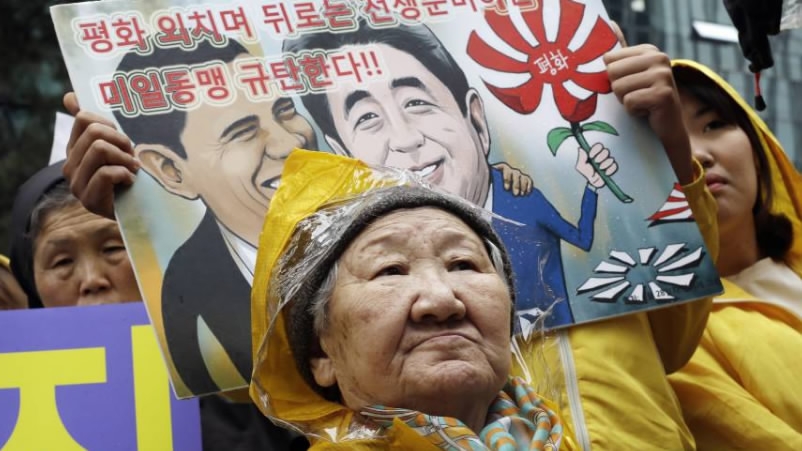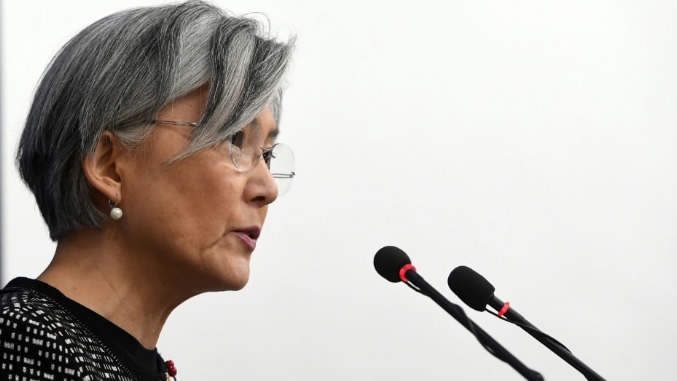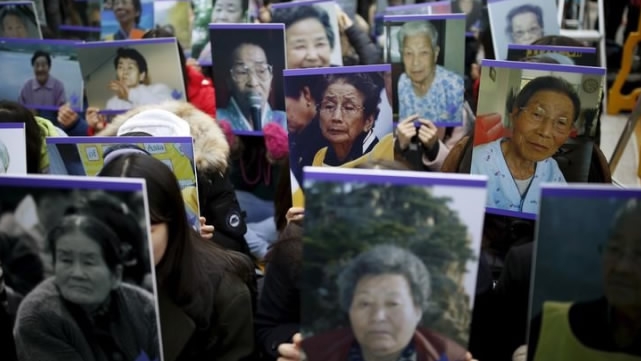
Politics
17:25, 03-Jan-2018
S. Koreans stage rally against Japan's wartime sex slavery after secret deal revealed
CGTN

Hundreds of South Koreans gathered outside the Japanese embassy in Seoul on Wednesday to protest against Japan's wartime sex slavery after a secret deal between the two countries was revealed last week.
About 400 South Korean citizens staged the so-called "Wednesday protest rally", which has continued for nearly 26 years, demanding apology from the Japanese government as well as legal responsibility for Japan's wartime crime against humanity.
Around noon, some people sat on cold mats while others stood outside the Japanese embassy in the freezing cold weather. People carried placards that read "Annul the 2015 Comfort Women Agreement" and "We Want Sincere Apology."

South Korean Foreign Minister Kang Kyung-wha speaks before a briefing of a special task force for investigating the 2015 South Korea-Japan agreement over South Korea's "comfort women" issue at the Foreign Ministry in Seoul, South Korea. /Reuters Photo
South Korean Foreign Minister Kang Kyung-wha speaks before a briefing of a special task force for investigating the 2015 South Korea-Japan agreement over South Korea's "comfort women" issue at the Foreign Ministry in Seoul, South Korea. /Reuters Photo
People laid yellow flowers at a girl statue, which symbolizes young women and girls who were kidnapped, forced or duped into sex servitude for Japanese military brothels during World War Two.
Historians say up to 200,000 young women, mostly from the Korean Peninsula, were forced into sex slavery at the time.
The Wednesday demonstration was the first since the South Korean government under President Moon Jae-in, who took office in May 2017, revealed its review result last week over the agreement that was reached on Dec. 28, 2015 between the Park Geun-hye government and the Japanese cabinet led by Prime Minister Shinzo Abe.
The review result showed secret deals in the 2015 agreement, which involved Seoul's acceptance of Tokyo's demand for persuading the South Korean victims and their supporters to accept the agreement, not using the word "sex slave" officially and helping to remove the girl statue symbolizing the victims.
The secret deals were not made known to the general public as well as the victims at the time. No communications were made between then South Korean government and the so-called "comfort women" before reaching the agreement in 2015.

Students hold portraits of deceased former South Korean "comfort women" during a weekly anti-Japan rally in front of Japanese embassy in Seoul, South Korea, December 30, 2015. /Reuters Photo
Students hold portraits of deceased former South Korean "comfort women" during a weekly anti-Japan rally in front of Japanese embassy in Seoul, South Korea, December 30, 2015. /Reuters Photo
"Comfort women" euphemistically refers to the victims of the wartime sex enslavement.
The then South Korean government under the impeached Park reached a "final and irreversible" agreement with Japan in return for receiving one billion yen (about nine million US dollars) dedicated to a foundation supporting the victims of South Korea.
President Moon said the "comfort women" issue cannot be resolved by the 2015 deal despite it being an official inter-governmental promise approved by the leaders of the two countries.
(Top Photo: Former 'comfort woman' Kil Un-ock, who was forced to serve as a prostitute for the Japanese troops during the war, attends a rally against a visit by Japanese Prime Minster Shinzo Abe to the United States, in front of the Japanese Embassy in Seoul on April 29. /AP Photo)
953km
Source(s): Xinhua News Agency

SITEMAP
Copyright © 2018 CGTN. Beijing ICP prepared NO.16065310-3
Copyright © 2018 CGTN. Beijing ICP prepared NO.16065310-3